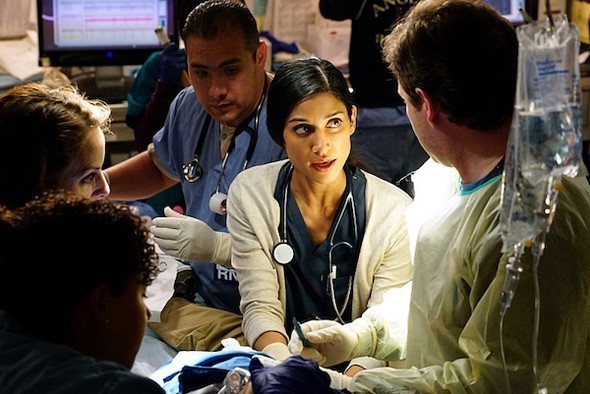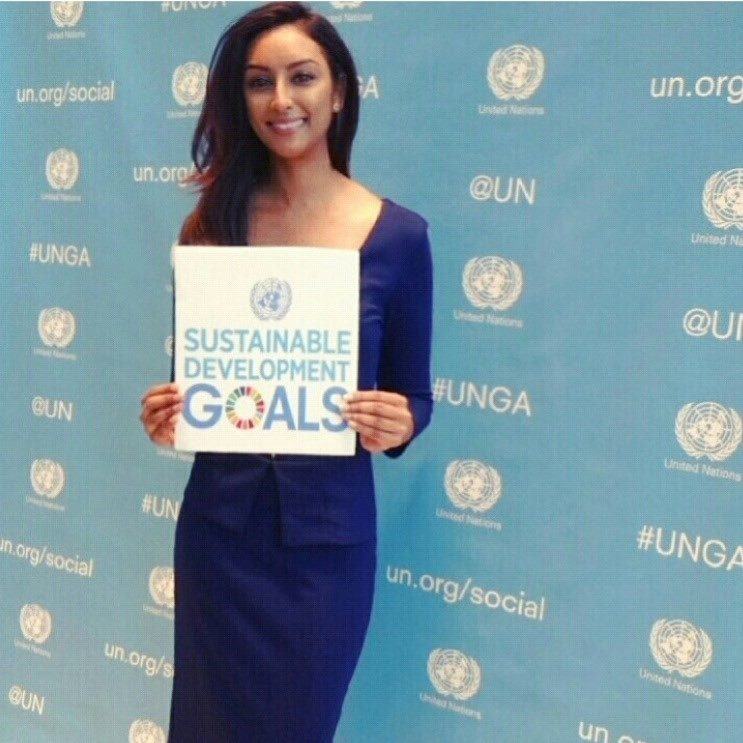Melanie Chandra is the Indian American actress currently known for her roles as Malaya Pineda on the gritty CBS drama Code Black and Roli on the Netflix comedy Brown Nation.
Now, the Stanford graduate is taking on a new role as an advocate for women.
Melanie’s path to Hollywood was unconventional. She was born to immigrant parents and raised humbly in the Midwest. A self-professed nerd, she worked diligently to get into an engineering program at Stanford University and upon graduation landed a job at a prestigious consulting firm in New York.
Melanie followed the expected trajectory for any bright young woman until one day she realized that following expectations didn’t matter to her anymore.
After this pivotal realization, she decided to forgo the path of corporate success and follow her creative heart into acting. She explains, “When I first told people that I was quitting my corporate job to pursue acting, they didn’t take me seriously. I had no experience and no network, but I knew I had the drive. My heart was in it. After long work days, I would attend acting classes to hone my craft. It was exhausting but I was passionate about it. I wouldn’t let what others thought of me affect my purpose or drive. If someone told me I would be limited to certain roles because of my ethnicity, I didn’t believe it for a second. The two things that mattered most were becoming the best actress I could be and using any access I gained to elevate the role of women and minorities in mainstream storytelling.”

During her time in Corporate America, Melanie observed that the atmosphere was increasingly supportive of women’s voices and career development even though they were still underrepresented in leadership roles. However, upon landing in Hollywood, she was disheartened by the number of women playing second fiddle to their male counterparts. After all, she expected the industry to be creative, liberal, and progressive. “Where are all the women calling the shots,” she wondered, “and where are the female heroes in our scripts?”
“My whole life, I was never made to feel that I was less than my male counterparts. Being a woman has always been a strength to me. It was only until I started working in Hollywood that I began to see things very, very differently.” – Melanie Chandra

After filming over fifty prime-time/cable TV episodes, Melanie has worked with thirty-five male directors, twenty-five male writers, and forty-five male executive or co-executive producers. Out of those same fifty episodes, she worked with only one female director, nine female writers, and fewer than twenty female executive or co-executive producers.
While
these numbers are shocking, what is even more shocking is that Melanie’s
experience is not unique.
In 2015, women accounted for only seven percent of directors, thirteen percent of writers, seventeen percent of executive producers, twenty-four percent of producers, seventeen percent of editors, and only five percent of cinematographers.[1] Melanie said, “In theory, the numbers should look more favorable as the pipeline of women in Hollywood builds.” However, research shows that the growth of women employed in key behind-the-scenes positions on broadcast network TV has actually stalled. In 2006, twenty-six percent of all individuals working on broadcast network programs were women. Today, that number has only climbed to twenty-seven percent. [2] That is a one percent increase over the past decade!
Because of this inequality, female-centric stories are most likely told less frequently than male-dominated ones. Melanie explained the further effects when she said,
“This means that most of the stories that make it to our TV and film screens, whether they are male-dominated or female-centric, are conceived by men, shaped by men, and greenlit by men. As an actress, this is so evident in the scripts I read and it’s frustrating because there is so much untapped potential for strong storytelling for women.”
Along with the need to increase women’s roles behind the scenes, there is also a need to increase the number of female characters in feature films. According to the Geena Davis Institute, female characters populate less than thirty percent of all speaking roles. [3] Even when there are strong female characters, they are not necessarily portrayed as the positive role models that future generations of girls need. Women should be represented on screen and portrayed in a positive way.
The success of Wonder Woman proves that there is an obvious demand for strong, positive female characters and female-centric movies.
Melanie knows first-hand that female characters can be role models and affect the lives of other women. She said, “Slumdog Millionaire was an eye-opener for me. It was released right around the time I wanted to leave my corporate job to become an actress. Freida Pinto, the Indian supporting actress, was thrust into the limelight when the movie won best picture. For the first time, I was seeing a young Indian woman in an Oscar-winning movie. Seeing Freida on screen, someone who remotely looked like me, was very meaningful. It gave me more hope, more optimism that I too could establish a path in Hollywood.”
This phenomenon has been dubbed “The Scully Effect” for the female lead in The X-Files. FBI Special Agent Scully, played by Gillian Anderson, inspired many young women to pursue careers in science, medicine, and law enforcement. As a result, there was a perceptible increase in the number of women entering those fields. Melanie hopes to also inspire women as she said, “Similarly, my character on Code Black, Malaya, is a lesbian and an intelligent E.R. doctor. I’ve had many women from the LGBTQ community reach out to let me know that Malaya inspired them to become doctors. It was something they didn’t think was possible before. It is incredibly fulfilling to hear that.”
“Melanie believes that girls need to see themselves reflected on screen because it is a huge signal that they matter. She specifically promotes more authentic, three-dimensional characters for women in leading roles, and calls on the industry to give women an equal and fair chance to write, direct, produce, and share those stories. She added, “Getting more women behind the camera as writers, directors, producers, and executives breeds more complete storytelling.”
[1] The Center for the Study of Women in TV & Film, The Celluloid Report, 2014
[2] Women and Hollywood , 2016
[3] Geena Davis Institute, seejane.org
Originally published in www.huffingtonpost.com


